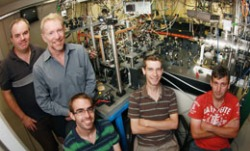Mar 2 2011
Researchers from the ARC Centre of Excellence for Quantum-Atom Optics at the Australian National University have created an atom laser that acts exactly as a light laser. This development paves way for new applications such as holograms.
 The Australian National University's Research Team
The Australian National University's Research Team
Andrew Truscott is the head of the research team comprising Ken Baldwin, Robert Dall, Andrew Manning and Sean Hodgman. The researchers have demonstrated that a beam of helium (He) atoms can be developed to have the characteristics same as a laser light beam. By cooling the atoms at one millionth of a degree of absolute zero, the researchers made the atoms to move in step and developed an atom laser beam, which exhibits the coherent property of laser without bunching.
Truscott said that when the time interval of photon arrivals in a laser beam is measured, it is observed that the photons get arbitrarily spaced with arrival times equally probable between photons. In contrast, incoherent sources like a light bulb demonstrate photon bunching in which the time interval of the photon arrival is short. Arrival of photons in pairs results in bunching of an incoherent light source called as second order or in triplets called as third order, he added.
Robert Dall commented that the researchers have also demonstrated that the atoms’ coherent property is lost when the atoms are warmed up and they once again demonstrated the bunching phenomenon in triplets and pairs, he added.